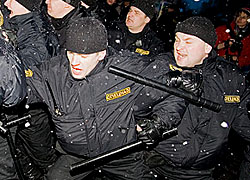Чаму камісар ЕЗ Ферэра-Вальднер не паехала ў Беларусь?
2- 12.03.2009, 9:24

Адмена візіту камісара ЕЗ можа быць звязаная са з’яўленнем у Беларусі палітвязняў, разгонам мірных акцый і самазабойствам праваабаронцы.

Адмена візіту камісара ЕЗ можа быць звязаная са з’яўленнем у Беларусі палітвязняў, разгонам мірных акцый і самазабойствам праваабаронцы.
Не понимаю, из-за чего весь сыр бор. ЕС поставил условия и сроки их выполнения - все, ждем результатов. Нет результатов, нет партнерства (кредитов, технологий, инвестиций). ЕС боится, что после этого в стране ухудшится политическая ситуация - так она и так хуже некуда (осталось только по ночам вывозить несогласных с курсом Сами знаете кого сами знаете куда). Боитесь, что Сами знаете кто уйдет в Россию? Ну и пусть, ведь тогда головная боль ЕС с транзитом ресурсов исчезнет - принимать решение будет не Сами знаете кто, а люди из кремля. Которые не заинтересованы в срыве их поставок на Запад и всячески будут пресекать попытки кого-либо поиграть на теме транзита.
АдказацьSome historic document for to see, how successful Benita Ferrero-Waldner has been in her appeasement diplomacy towards the Lukashenko regime. This information was published in 2001 !!
АдказацьOSCE WORRIED BY POLITICAL STAND-OFF IN BELARUS
On March 1, Benita Ferrero-Waldner, Chairperson-in-Office of the OSCE and Austrian Foreign Minister, expressed satisfaction with the repeated commitment of the Belarusian authorities to free, fair and internationally recognizable parliamentary elections this fall but voiced her concern about the passing of the electoral code before a substantial dialogue with the opposition.
"I welcome the agreement by Alexander Lukashenko to the declaration of the OSCE summit in Istanbul, which emphasized 'that only a real political dialogue in Belarus can pave the way for free and democratic elections, through which the foundations for real democracy can be developed'," says the statement by Ferrero-Waldner. She expressed regret that in spite of numerous OSCE initiatives since 1997, it has not yet been possible to establish national consensus on the framework conditions for free and fair parliamentary elections. She called on the Belarusian government to renew a real political dialogue with the opposition in order "to overcome the constitutional controversy and the still existing discrepancies of the present version of the electoral code with OSCE standards." Ferrero-Waldner stresses that time is running out for a meaningful dialogue. (Belapan, March 1) 2001